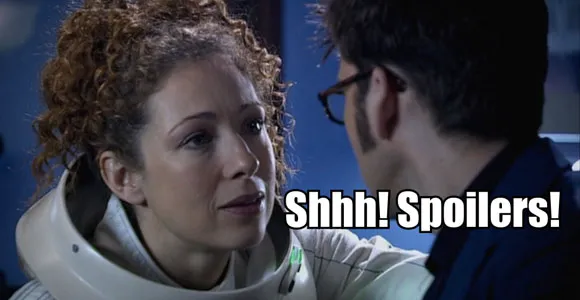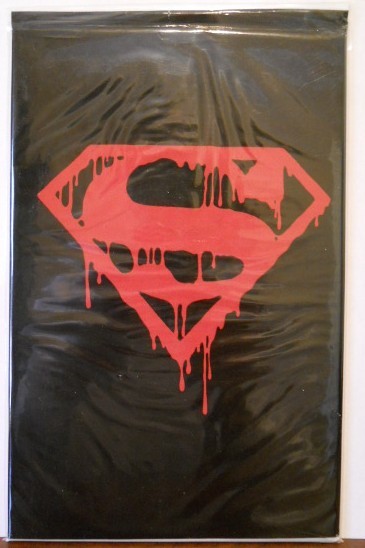First, for those who don't know what I'm talking about, let's turn to Urban Dictionary (heh) for a definition:
When someone reveals a previously unknown aspect of something which you likely would have rather learned on your own.
*discussions of art media such as video games, movies, etc. especially vulnerable.
*discussions of art media such as video games, movies, etc. especially vulnerable.
"The following review contains spoilers!"
 |
| Thank you, Doctor Song. |
I'm going to add my own addendum: If the topic of a spoiler is several years old and was moderately available/popular, the spoiler is completely kosher. Anything else should be off-limits until established otherwise by the uninformed (an unspoiled) party.
In example, this post will contain spoilers to Star Wars: The Empire Strikes back. If you have not seen this movie or learned what the major twists are, that is your fault and I refuse to step lightly when discussion the subject. If I was to discuss, say, the Ender's Game movie, however, I would make sure to throw up spoilers. In fact, due to the new medium in which the story is being related, I'd probably also put an embargo on any future discussions of the novel as well.
If someone had told me that Darth Vader was Luke Skywalker's father before I saw the climactic scene, all the sense of wonder in the movie would have died. All the cinematography leading up to that moment would have been obvious and, in translation, ineffective.
 |
| "I am your father." "Well, duh." |
This doesn't mean you can't write about the subject, you just need to mark it appropriately. See Wil Wheaton's review of Star Trek: Into Darkness for one example of an appropriately marked spoiler.
I've seen MANY Facebook arguments where folks I generally consider intelligent claim that there's nothing wrong with spoilers and that it is the reader/viewers fault for stumbling onto them. The generally say this after having been scolded for spoiling something recent/relevant.
I stop considering these folks intelligent pretty quickly after that (well, that's a bit harsh, but you get my meaning).
The nature of sites like Facebook or Twitter means that a viewer has no way to filter what they see once they've followed a person/account. If the person/account let's it be known that they post spoilers frequently, then that is the follower's fault. MOST PEOPLE DO NOT STATE THIS. And even if they did, the nature of these websites (and similar ones) still make this difficult to recognize before hand.
The simple way to avoid an issue is to mention that you're about to spoil something, give it a bit of space (because we read complete thoughts faster than we think), and THEN write the spoiler. If it is an image, LINK to it, don't post it on your account. Blog writers have many more options, but I'll assume you bloggers aren't dicks and don't spoil things because you know better.
Pretty simple, yes? Well, that's only half my spiel, the one that pertains to the general public. Now I'm going to complain about the media.
 |
| THIS is good advertising! |
... What? Why? Have they forgotten that anticipation of the unknown is a powerful tool? Back it my day, comic books would come in BLACK BAGS if the cover was too spoiler-y.
Movie commercials now spoil 90% of the story (or, in comedies, all of the funny parts).
Book descriptions lately seem to tell what the turning point is for the character as if assuming you're never going to find out for yourself anyway.
Comic books are spoiled before they ever reach the stand ALL THE TIME. Apparently just so readers (or critics) can talk about them in advance. Uhg. It isn't just about how it's done that gives a reader enjoyment. I didn't like knowing that Doc Ock was taking over Spidey before it happened, it made the preceding issues leave a bad taste in my mouth.
Video games... Well, actually, that's still a decently safe medium. Unless you frequent message boards on the given title, but that's a risk you take. I assume this is so due to the length of most games meaning the general population has no interest in them. A gamer that plays through a game probably realizes that some of their enjoyment derives from getting to a particular point ON YOUR OWN.
I'm hoping for a day when instant gratification isn't the only form of advertising pandered to. My favorite thing about the RISK: Legacy version is because it has secrets that I have yet to uncover, and a truly have no idea what lies behind the sealed envelopes/sections. Something new and exciting is waiting for me, and I don't have to play each game with the knowledge of what comes next. Sure, I might not like the surprise, but at least it was a surprise and not a stretch of time dreading the moment.
... Basically, just think about others before describing a plot twist or character death. Don't try to be obscure, because that doesn't always work. Just label an incoming spoiler clearly and give it some space. Oh, and be careful with URLs that tell too much...
 |
| /NerdRage |






No comments:
Post a Comment